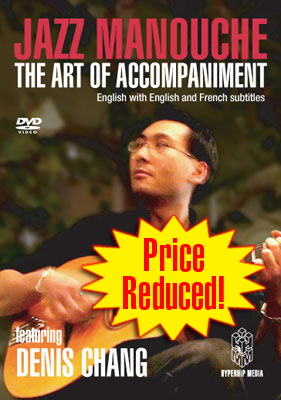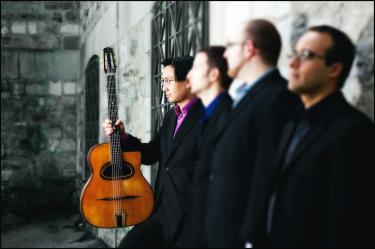Denis Chang is one of the dearest contemporary Gypsy Jazz musicians. He’s devotion to the music and astonishing work ethic built a reputation amongst the greatest.
He’s been working on stage with some of the most prestigious Gypsy Jazz musicians and his work extends off stage by providing some of the best instructional videos of the genre.
Recently his DC-Music School released exclusive videos and instructional contents “In The Style Of” Bireli Lagrene and Frank Vignola. Other artists, such as Adrien Moignard, Hono Winterstein, Sebastien Giniaux or Tcha Limberg, are also listed at DC-MusicSchool.com
Here’s one of the most honest, complete and detailed interview I’ve managed to put together. Gratitude is the word, Mr. Chang!
1 – What have inspired you to start playing music? Tell us about your influences and what was going on around you at the time.
I started getting serious about music because many of my schoolmates were already playing music.
I started with classical guitar but did not study it for too long because I did not like having to maintain my nails. It’s too bad because I think it’s really wonderful music. I really regret stopping.
2 – How’s the Gypsy Jazz movement in Canada?
It is quite small, but there are people interested in it, nonetheless. I would say that Montreal (Quebec), Vancouver (BC), Victoria (BC), and Toronto (Ontario) have the biggest communities.
3 – What motivated you to keep practicing?
I really wanted to have the Gypsy sound. I was very obsessed with it. Early on, a local friend told me that it was impossible for non-Gypsies to learn to play like Gypsies. That made me wonder why, and I became very obsessed with trying to understand what the sound was.
I became very happy when many Gypsy musicians told me that I played like a Gypsy. Of course, that is just a sound issue. One doesn’t have to have a Gypsy sound to be a great musician, and today, I am not obsessed with it anymore. I try to be myself, whatever that means.
4 – Your DC Music School offers lots of great instructional material featuring some of the greatest Gypsy Jazz players. How did it all started? Tell us about that experience, evolution and new projects.
Learning music was extremely difficult for me in an era before YouTube and away from any strong musical communities. The internet was still in its infancy, and it was extremely hard to find information about almost anything.
I struggled very hard, and I had to learn almost everything I know today, on my own. Of course, I had lessons and some help, but for the most part, I had to rely on myself to figure out a lot of important things that I teach today.
I traveled a lot to Europe to understand the way the Gypsies played the music of Django Reinhardt. I made friends with a lot of Gypsy musicians.
In 2006 or so, I decided to share my knowledge and I approached a Canadian publishing company that agreed to distribute a DVD on learning how to play Gypsy Jazz rhythm. Actually, I didn’t expect that it would be any success. This was a time when information was still hard to find for anyone who didn’t have the opportunity to travel to western Europe where most of the Gypsy players live.
I produced the DVD especially for people outside of western Europe. The DVD ended up being a tremendous success. I think we sold all the copies that were made within one year. With that money, I decided to make more which ended up being quite successful too. So I decided to approach other musicians such as Tim Kliphuis, Wawau Adler, and Stochelo Rosenberg. I produced instructional DVDs for them as well.
Eventually, I decided I wanted more control over the production and distribution, so I decided to do things myself. This would allow me to give much more money to the artists. I feel that they deserve to be generously compensated. I have heard about a lot of horrible stories of artist mistreatment from labels/companies, and I did not want to do things that way.
I really want to share information with the world and also help the artists as much as I can. Word eventually spread around that I treated artists/customers fairly and respect, and that opened a lot of doors for me.
I am very thankful for the people who support my business. While 100% of my income is derived from musical activities, money has never been a top priority for me. Sincerity always came first, so I put my heart and soul into everything I do. If I felt that a product was not up to my standards, I would not release it. This has happened in the past, and I have lost lots of money because of this, but rather than release a product that was not up to my standard, I’d rather lose money but maintain my reputation.
I care about the artists and the customers who support my business.
5 – What were the biggest challenges you have faced in order to progress in your practice, performance and musical career?
As I mentioned, learning music was extremely difficult for me, because I had almost no guidance, so it took me many years to figure out things that my students can now learn in just a few years, if not months.
I don’t regret anything though, because it really sharpened my sense of observation. Today, I am able to notice things that most people don’t notice. It’s the little details that make up the big picture, and I understand these details now.
Otherwise time and money are always something to worry about when you are an adult. I love DC Music School, but in order to pay my artists the money I can pay them, I have to do a lot of work on my own. I’m starting to be able to delegate some work to other people, which helps, but for the most part, I still do a lot on my own.
This obviously, takes away from my practice time. I go through different phases and it is never consistent. Sometimes I’m working on videos, other times I’m practicing, and sometimes I do concerts or go on tour.
The music business is extremely difficult and is not set up to be in favor of musicians, unfortunately. Therefore, DC Music School is a tremendous help for me financially. I don’t get rich from it, but it allows me to eat!
I also have a lot of family from around the world, and it’s not easy to see them, so flights become expensive. I also work hard and save money, in case I have a family to take care of in the future.
Unfortunately, all this eats up into my practice time. Such is life. I read an interview with Bireli Lagrene recently, and he talked about why he got so good. He simply said that he was younger than everyone else, and that he had more time to practice because everyone else was going to school or going to work.
Life is like that, there is always a trade for whatever you do. I know amazing artists who continue to practice today, but I know that they struggle financially, it’s simply not easy. You have to find the right balance.
6 – You’ve already studied, played and worked with lots of Manouche legends. Tell us about those travels, experiences and insights you’ve been gathering along these years. Any particular memory, meeting or person you could share with us?
Well, we are all human beings. When I was younger, I certainly idolized many of the players that I have had the opportunity to work with.
Today, while I still certainly respect and admire them, they are fellow human beings to me, and I don’t necessarily see them with starry eyes.
I am thankful for having had the opportunities that I’ve had but some of my favorite moments were with people who are not famous at all. In the end, I care more about the human side of a person than the achievements.
When I was starting my music career, I went to see a famous player once. After his concert, I asked him if he would be interested in coming to my cafe show close by to jam a bit. He rejected me. Many years later, that same person ran into me and said “I know you, you are Denis Chang, would you like to join me on stage?”
It was kind of funny, but at the same time, it made me wonder about lots of things in life. No matter how known I am, none of that matters with me; I don’t want it to affect how I deal with others. If anyone is nice and wants to jam with me, I’m happy to jam with them. There are also people who abuse of my generosity, but that’s OK, I just cut them off from my life.
For the most part, most people are quite nice and I’m happy to have met these people. Not that I’m famous or anything, but if I rejected everyone who talked to me, I wouldn’t have met some of my best friends today. That said, I do get tremendous amounts of messages on Facebook, and I really can’t chat with everyone. I do feel bad, but if I had to chat with every single person, I would have no time to do anything else.
7 – Do you remember your practice process when you started playing? How much did it change through the years?
Yes I do remember, because it was so hard for me to know how to practice. Without any proper guidance, you are on your own.
I spent most of my early years figuring out the Gypsy sound. I would watch bootleg VHS of players like Stochelo Rosenberg, Jimmy Rosenberg, Angelo Debarre, etc. I would spend hours listening to Django Reinhardt, and all the Gypsy artists that I liked.
I worked a lot on the rhythm sound. I noticed a lot of differences between non-Gypsy players, and Gypsy players, and I wanted to understand how to get that sound.
Again, it’s too big a topic to summarize here, but that was the kind of stuff that I practiced. Today, my goals are different, now that I am more knowledgeable and experienced.
Today, my priority is all about the basics. I have noticed one thing that every great player has, regardless of genre: a mastery of the basics. The basics are: good ears, sound and good rhythm. Those are the only things that matter above all else. Anything fancy is great, but without these basics all the fancy stuff will sound fake.
If you have good ears, you will know what to play. If you have good sound, you can color the music with dynamics, ornaments, and various tonal colors. If you have good rhythm, you can make the most basic melody groove so hard. These are things that you can work on for the rest of your life and that is the stuff that interests me the most.
There are many people trying to copy players such as Adrien Moignard, Sebastien Giniaux, Bireli Lagrene, etc. Many manage to copy the ideas and licks, but without wanting to sound negative, I can sometimes hear things that are lacking. Those things are what I mentioned. It does not matter if you know Adrien’s lines if you play them with weak tone and weak timing.
What I admire in Bireli Lagrene, is the same thing that I admire in a player like BB King to give a huge constrast. They have great ears to play the music that they play. Therefore the music is extremely sincere.
The music is not coming from muscle memory but from their ears, and therefore from themselves. They deliver their music with different colours, bends, vibrato, ornaments, dynamics, etc. It makes the music alive. They play their music with the right kind of timing, so that it really speaks to any audience!
8 – Tell us about your routines. How does a regular day in your life looks like?
My routines constantly change. When I don’t have any projects for DC Music School or something like that, I am usually practicing but when I have projects, then most of my time is spent working on them. Unfortunately, or fortunately, I have projects lined up until 2017.
9 – You’ve been able to manage a professional musical career, create a GJ School, edit videos and transcriptions of great players, write articles for blogs, compose and perform, spreading the word about the new GJ scene. How do you manage and prioritize your activities and stay extremely productive?
I don’t think I manage to balance things the way I want to but thanks. I suffer from insomnia, and a mind that has a lot of trouble shutting itself off.
I’m always thinking, and its effect on my health is not very good to be honest. But I’m not complaining about it, this is the way I am, and I accept it.
To give you an idea of how bad it is, when I’m walking down a street, and I see a car wanting to turn onto my street, I immediately calculate all the possible scenarios in my head. If I cross the street now, the car won’t be able to pass, and there are people behind me. The car will have to wait a long time. If I let the car pass, I lose 3 seconds, but I save that car a minute or two, and therefore I let him pass. That’s a very dumb example, but that’s how my brain is always active! I suppose it’s a blessing and a curse.
10 – How do you balance work and rest? How long are your working sessions and pauses?
I am very extreme in my work process, which might not be so good for my health; I have trouble correcting it. When I work, I’m like a machine 🙂
There are people who have seen my work, and that’s always what they say. I’m literally like a computer. I’m actually a very lazy person, so I work hard to find the fastest and most efficient way to work without sacrificing quality. I know it’s ironic, but it’s true.
So if I’m working with a software like Logic (audio recording program), I have managed to memorize all the keyboard shortcuts, so I barely use my mouse, I can work extremely quickly this way. That’s also how I can transcribe extremely quickly. Otherwise, when I don’t have too much work, I can be quite lazy and spend the entire day watching movies and practicing.
11 – What are your future plans and goals?
I really want to expand DC Music School with other styles. There are already other styles in it, and I wish to push that even further.
I’m also focusing on my personal music career. I hope to somehow revive it even if the performance industry works against the artists.
I’ve just re-launched my personal website www.denischang.com where I hope to maintain an active blog with lots of lessons, music, videos, etc.
12 – What do you value the most in the music/musicians you love to listen? What key ingredients you love to hear when listening to some new album, musician or student?
It’s all about musical sincerity. I listen for things like rhythm and sound. It doesn’t matter whether the music is complicated or not, if it’s well-played, then I love it. Nonetheless, I find myself listening to a lot of Django Reinhardt recently. This Gypsy Jazz style comes from him, and he truly is an endless source of inspiration and educational material.
13 – Do you meditate? Do you perform any kind of practice or activity that pulls you towards a more focused, clear or mindful state?
No, I just try to work out and eat healthy (not always successful though).
14 – What would you consider to be the most important advice, quote or reference someone ever gave to you?
When I was quite young, a guitar teacher told me that it was important to train my ears. For some reason, that stuck, and even though I do know a lot of theory, most of everything that I know was learned by using my ears and training my memory. The more you train your ears, the faster you will get better. It’s guaranteed.
You won’t even have to know too much theory, because if you keep training your ear, eventually you’ll start hearing music in your head, and you will know what to play even if you don’t know the theory behind it. I’ve noticed that with players like Bireli Lagrene, Stochelo Rosenberg, etc.
Nonetheless, you still have to spend many hours also practicing your instrument, and that’s unfortunately where it is difficult for me. You can train you ear anywhere at any time. In your head right now, you can try to sing happy birthday and try to identify each note and the intervals. So if you’re in the key of C, you should know that the first note is G, etc.
So many people are afraid to train their ears because they are afraid to make mistakes when figuring out music by ear. That is nonsense to me! That’s the point! You have to make these mistakes! It’s like not wanting to learn to ride a bike because you’re afraid you’ll fall! These mistakes are normal, and if you keep training your ears, you will eventually hear things right! It’s guaranteed. It can be done by anyone at any time!
15 – What about “Mr. Bear”, your faithful companion, is it a mascot or your own trademark?
Mr. Bear is my son and travel companion, he’s quite a talented guitarist.
16 – What would you like to be acknowledged for? What’s the most important aspect of your life’s journey that you’d like people to remember?
Honestly, I really just try to do my own thing. If I could give anyone any advice though, it’s to try not to be too influenced by conventional wisdom and not to judge too quickly and assume things.
Question everything you hear and see. Try to deeply research everything that interests you. Try to observe both sides of the arguments, and form your opinion from there, not from what you are told. Learn about the history of the topic that interests you. I really think that if people did this, the world would be a much better place, and peace would be attainable.
17 – What would you say to Django if you had the chance to meet him? What would be the record, the musician or the song that you would always refer in a conversation with Django?
I’m not sure what I would say to him. I would love for him to agree to allow me to produce an instructional video for him!





